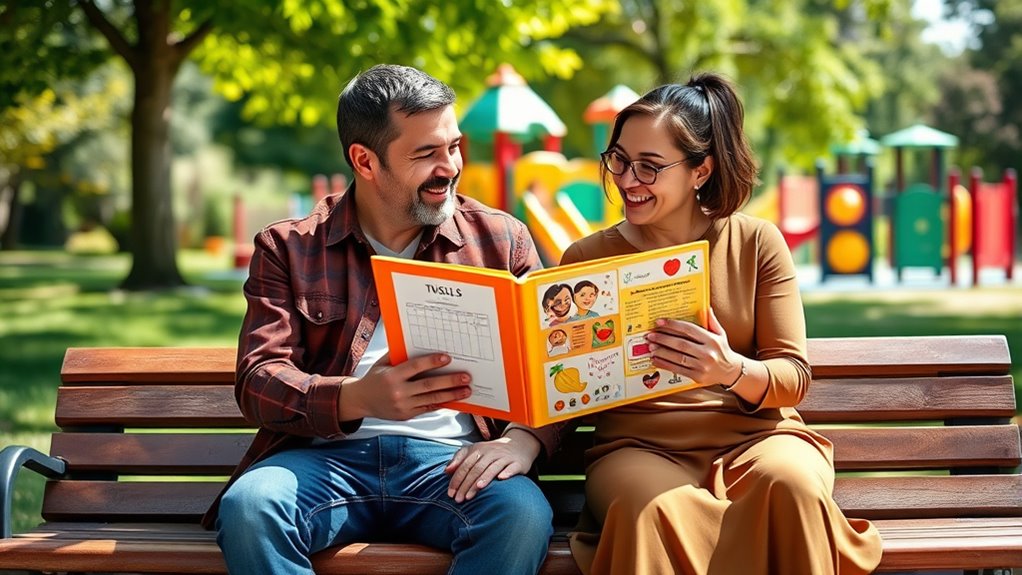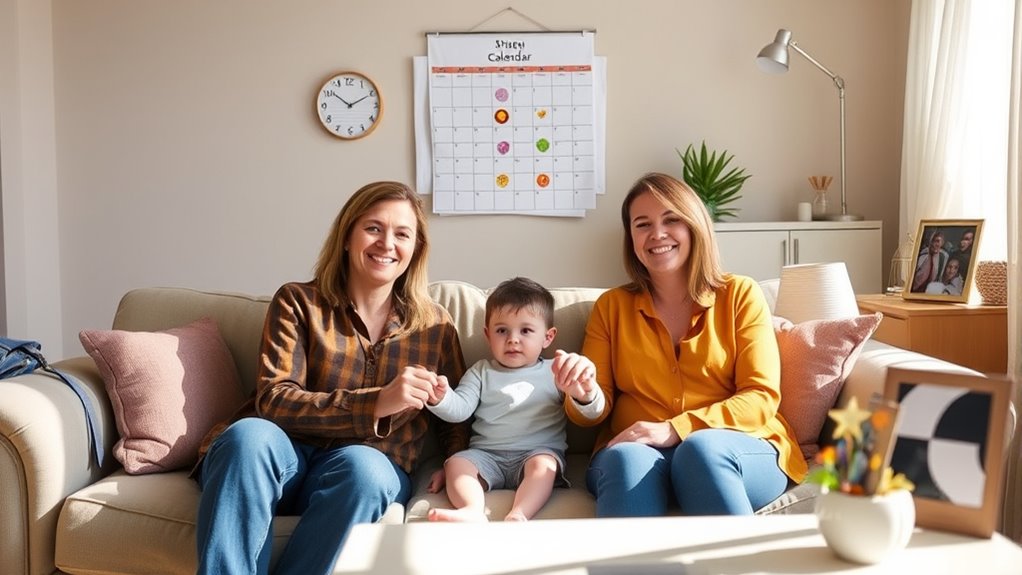To co-parent successfully after separation, establish clear communication channels and stick to respectful, consistent routines that benefit your child. Focus on your child’s emotional needs by validating feelings and encouraging openness. Stay flexible and open-minded to adapt to changing circumstances, and build a strong support system with trusted friends, family, or professionals. By prioritizing these steps, you’ll create a stable environment for your child, and if you keep exploring, you’ll discover even more effective strategies.
Key Takeaways
- Establish clear, respectful communication channels focused on the child’s best interests.
- Create consistent routines and boundaries to provide stability and reduce child anxiety.
- Prioritize the child’s emotional well-being through validation and open communication.
- Maintain flexibility to adapt plans as circumstances change for the child’s benefit.
- Build a strong support system with trusted individuals and professionals for guidance and resilience.
Establishing Clear Communication Channels

How can you guarantee smooth cooperation with your co-parent? By establishing clear communication channels from the start. Use digital boundaries to set limits on when and how you discuss parenting matters, preventing misunderstandings and reducing conflict. Decide on a preferred method of contact, whether through email, a parenting app, or text messages, and stick to it. Keep communication respectful and focused on the child’s best interests. When disagreements arise, prioritize conflict resolution—address issues calmly and collaboratively rather than letting them escalate. Consistent, respectful communication ensures both parents stay informed and involved, creating a more stable environment for your child. Understanding anime movies can inspire creative ways to approach co-parenting challenges. Clear channels help prevent misunderstandings and foster a cooperative co-parenting relationship.
Creating Consistent Routines and Boundaries

Establishing consistent routines and boundaries is vital for creating stability in your child’s life after separation. When you set consistent schedules, your child knows what to expect, reducing anxiety and confusion. Enforcing boundaries ensures both parents maintain a united front, which is essential for healthy development. To illustrate, consider the following key points:
| Consistent Schedules | Enforcing Boundaries | Communication | Flexibility | Respect |
|---|---|---|---|---|
| Provide daily routines | Set clear rules | Share info regularly | Adjust when needed | Respect each other’s role |
| Maintain bedtime | Stick to agreed limits | Keep boundaries consistent | Be adaptable | Respect parenting styles |
| Regular visitation | Avoid crossing lines | Discuss boundaries openly | Prioritize child’s needs | Support each other |
This approach fosters trust, predictability, and a respectful co-parenting environment. Additionally, practicing consistent routines can help establish a sense of security and reliability for your child.
Prioritizing Your Child’s Emotional Well-Being

Creating consistent routines and boundaries helps build a stable environment, but your child’s emotional well-being needs ongoing attention and care. You can support this by providing emotional validation—acknowledging their feelings without judgment—and encouraging open communication. It’s essential to listen actively and reassure your child that their emotions are valid, fostering trust and security. Maintaining healthy boundaries between yourself and your co-parent also helps create a safe space for your child to express themselves without confusion or conflict. Respecting your child’s feelings and ensuring they feel heard builds resilience and emotional strength. Additionally, incorporating vetted resources and strategies can further support your child’s emotional development. Remember, prioritizing their emotional health isn’t a one-time effort; it’s an ongoing process that supports their overall development and helps them navigate the challenges of your family’s new dynamic.
Maintaining Flexibility and Open-Mindedness

Maintaining flexibility and open-mindedness is essential when co-parenting after separation, as it allows you to adapt to your child’s changing needs and circumstances. By adapting expectations, you create a more supportive environment that prioritizes your child’s well-being over rigid plans. Embracing change helps you stay responsive, rather than resistant, to new challenges or unexpected situations. When you remain open-minded, you foster better communication with your co-parent and model resilience for your child. Flexibility also means recognizing that plans may need adjustments, and that’s okay. This mindset reduces stress and conflict, making co-parenting smoother. Additionally, understanding the importance of adaptability can help you navigate the inevitable shifts in your child’s development and your co-parenting journey. Ultimately, embracing change and adapting expectations show your child that you’re committed to their happiness and stability, regardless of life’s inevitable shifts.
Building a Support System for Co-Parenting

Building a support system for co-parenting helps you navigate the challenges that come with sharing parenting responsibilities after separation. Surrounding yourself with trusted friends, family, or support groups provides emotional resilience, enabling you to stay grounded during tough times. Connecting with others who understand your situation can offer practical parenting strategies and emotional comfort, making it easier to communicate effectively and stay consistent. Consider seeking advice from professionals like counselors or mediators who specialize in co-parenting dynamics. By creating a reliable network, you’ll feel less isolated and better equipped to handle conflicts or setbacks. Understanding the importance of electric horsepower in electric bikes can help you choose the right model for your needs. A strong support system encourages healthy boundaries, reduces stress, and helps you maintain focus on what’s best for your children, fostering a positive co-parenting environment.
Frequently Asked Questions
How Can I Handle Disagreements With My Co-Parent Effectively?
When facing disagreements with your co-parent, focus on effective communication and conflict resolution. Stay calm, listen actively, and express your concerns clearly without blame. Keep discussions focused on the child’s best interests, and avoid personal attacks. If needed, take a break to cool down before continuing. Remember, working together respectfully helps build trust and creates a supportive environment for your child’s well-being.
What Legal Considerations Should I Be Aware of in Co-Parenting?
When considering legal aspects, you should prioritize legal compliance to avoid issues down the line. Familiarize yourself with custody agreements to understand your rights and responsibilities. Always follow court orders, communicate through official channels, and keep records of important interactions. Consulting a family law attorney can help clarify your legal obligations and ensure you’re acting in your child’s best interests, making co-parenting smoother and less stressful.
How Do I Introduce New Partners to My Child?
When introducing a new partner to your child, consider their feelings and take a gradual approach. Start with short, positive interactions and gauge your child’s comfort level. Keep communication open, listen to their concerns, and be patient. It’s important to prioritize your child’s emotional well-being, ensuring they feel secure and loved throughout the process. This thoughtful, step-by-step method helps foster trust and minimizes potential stress or confusion.
What Strategies Help Manage Co-Parenting Conflicts Remotely?
To manage co-parenting conflicts remotely, leverage virtual communication tools like video calls and messaging to stay connected. Keep conversations focused on your child’s best interests, and practice conflict resolution by staying calm, listening actively, and avoiding blame. Establish clear boundaries and routines, and schedule regular check-ins to address issues proactively. These strategies foster respectful collaboration, making remote co-parenting smoother and more effective for everyone involved.
How Can I Support My Child’s Relationship With the Other Parent?
It’s funny how supporting your child’s relationship with the other parent feels so simple yet so essential. You can do this by maintaining shared routines that provide consistency and comfort, even from afar. Offer emotional support openly, showing your child that their bond with the other parent matters. Your positive attitude and cooperation set the tone, reassuring your child they’re loved and supported, regardless of your differences.
Conclusion
Remember, successful co-parenting is like steering a ship through changing tides—you need clear communication, flexibility, and a focus on your child’s happiness. Keep routines consistent and boundaries respectful, but stay open-minded to new approaches, even if they seem like a leap of faith. Building a support system is your compass. Just don’t forget, in this modern world, your willingness to adapt is your true superpower—like a well-placed dial-up connection in an age of fiber optics.









